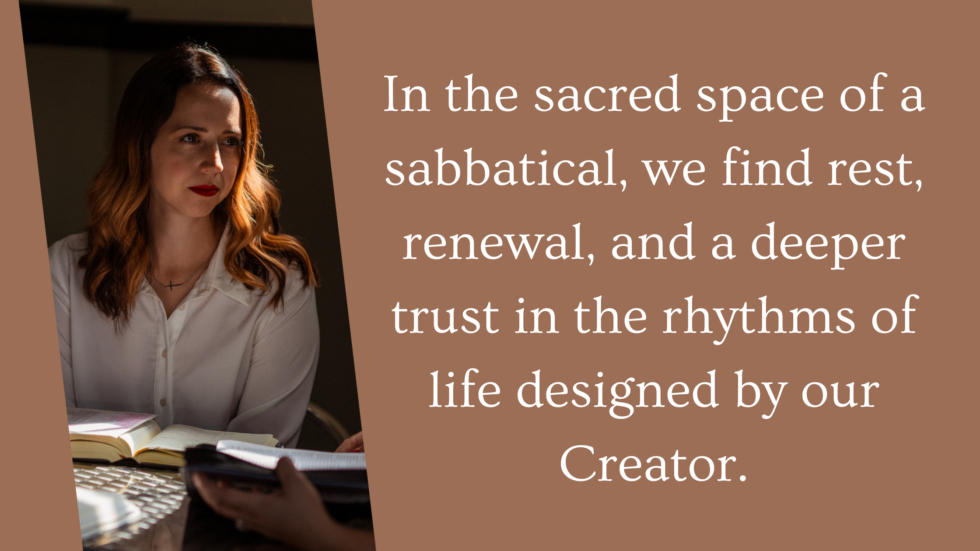Today, I want to share the difference between a sabbatical and a sabbath. Each is very important, but each is taken for different purposes. Although our focus will be on taking a sabbatical, it’s important we also know what a sabbath day is too.
In our fast-paced world, slowing down doesn’t seem like an option. We convince ourselves that slowing down and resting means falling behind or being lazy. How easy is it for us to forget that we don’t have to work to earn rest, but rest was given to us by God?
When is a Sabbath Day
The Bible traditionally observes the Sabbath day on the seventh day of the week, which is Saturday. The Genesis account of creation roots the concept of the Sabbath, where God rested on the seventh day after creating the world. Emphasizing the importance of observing the Sabbath, the Ten Commandments state, “Remember the Sabbath day, to keep it holy” (Exodus 20:8).
It’s worth noting that different religious traditions may interpret and observe the Sabbath differently. While Saturday is the traditional Sabbath day for many Jewish and some Christian denominations, some Christians observe Sunday as the Sabbath, commemorating the day of Jesus Christ’s resurrection.
Read more on Sabbath:
How Did Sabbath Become Sunday Worship
What is a Sabbatical
The term “sabbatical” in the Bible refers to the practice of observing a Sabbath or a period of rest and renewal. The concept is rooted in the biblical tradition of the Sabbath when God rested on the seventh day after creating the world. The word “sabbatical” is derived from the word “Sabbath.”
In the Old Testament, particularly in the laws given to the Israelites, there were provisions for the observance of sabbatical years. According to the book of Leviticus, every seventh year was designated as a sabbatical year, during which the land was to rest from cultivation, debts were to be forgiven, and slaves were to be set free. This practice was intended to promote social justice, environmental sustainability, and a reliance on God’s provision.
Additionally, the concept of sabbatical rest extends to individuals. In the context of academia and certain professions, a sabbatical is a period of leave granted to individuals for research, study, or renewal. While not explicitly mandated in the Bible in the modern sense, the idea of taking time for rest and rejuvenation has its roots in the biblical concept of the Sabbath.
Difference Between a Sabbath Day and a Sabbatical
Although sabbath and sabbatical come from the same root word, each has its own meaning.
Sabbath is a day or period of rest, typically observed weekly. The has its origins in Hebrew and is deeply rooted in religious traditions, particularly Judaism and Christianity.
Traditionally, the Sabbath is observed on the seventh day of the week, which is Saturday in Judaism and Sunday for some Christians. It involves rest from work, worship, and reflection.
Sabbatical refers to an extended period of leave granted to an individual. A sabbatical is often from work or academic responsibilities for the purpose of rest, study, research, or personal development.
While biblical roots underlie the concept of taking a break for rest and renewal, modern usage more commonly associates the term “sabbatical” with academic and professional contexts.
Sabbaticals are typically longer than a day and can last for a few weeks to a year. They are not necessarily tied to a weekly observance but are granted periodically for personal and professional development.
While both terms involve the idea of rest and renewal, “Sabbath” refers to a regular day of rest observed weekly, often rooted in religious traditions. “Sabbatical” refers to a more extended leave from work or academic duties for personal and professional development.
How to Prepare for a Sabbatical
Preparing for a sabbatical involves careful planning and consideration of various aspects to ensure a meaningful and restful time with the Lord. Here are practical ways to help you prepare for a sabbatical:
Define Your Purpose: Clarify the purpose of your sabbatical. Whether it’s rest, personal development, travel, or a combination, having a clear goal will guide your preparations. What is God asking you to do?
Financial Planning: Assess your financial situation and plan accordingly. Save for the sabbatical, budget for expenses, and consider any financial adjustments needed during the break.
Communicate with Employers or Institutions: If applicable, discuss your sabbatical plans with your employer or relevant institutions well in advance. Understand the policies and procedures for taking extended leave.
Plan the Duration: Decide on the duration of your sabbatical. Whether it’s a few weeks, months, or a year, having a defined timeframe will help structure your plans. How long is God asking you to take this sabbatical?
Delegate Responsibilities: If you have work or personal responsibilities, delegate tasks to others or create a plan for how responsibilities will be managed in your absence.
Create a To-Do List: Develop a to-do list of tasks to complete before the sabbatical. This may include wrapping up projects, meeting deadlines, and tying up loose ends.
Prepare Mentally and Emotionally: Mentally prepare for the sabbatical by acknowledging and addressing any anxieties or concerns. Ready your heart for what God will do during this time.
Set Boundaries: Establish boundaries for your sabbatical. Clearly communicate your availability to friends, family, and colleagues, and set expectations for communication during the break.
Reflect and Set Goals: Take time to reflect on what you hope to gain from the sabbatical. Set personal, professional, and spiritual goals.
Leave a Buffer Period: Consider leaving a buffer period before and after the sabbatical for a smoother transition. Use the time before to finalize preparations and the time after to readjust gradually.
Remember that the key to a successful sabbatical is thoughtful planning and a commitment to the goals you’ve set with God. Adjust these steps based on your unique circumstances and the nature of your sabbatical. What is your intention during this time with God?
Sabbath Day in the Bible
In the Bible, the term “sabbatical” is not used in the modern sense of taking an extended leave from work or responsibilities. However, the concept of rest and periods of ceasing from labor is deeply rooted in biblical principles, particularly in the observance of the Sabbath. Here are a few examples from the Bible.
- Sabbath Rest (Exodus 20:8-11):
- The fourth commandment in the Ten Commandments instructs the observance of the Sabbath day. “Remember the Sabbath day, to keep it holy. Six days you shall labor, and do all your work, but the seventh day is a Sabbath to the Lord your God.”
- Sabbatical Year (Leviticus 25:1-7):
- In addition to the weekly Sabbath, there were regulations for a sabbatical year every seventh year. This was a year of rest for the land, forgiveness of debts, and release of slaves.
- Jubilee Year (Leviticus 25:8-13):
- The Jubilee year occurred after seven cycles of the sabbatical year, on the fiftieth year. It involved a release of debts, a return of ancestral property, and a time of celebration.
- Restoration and Healing on the Sabbath (Mark 2:23-28; Luke 13:10-17):
- In the New Testament, Jesus talked often about the actions related to the Sabbath. He emphasized the Sabbath’s purpose of restoration and healing, challenging legalistic interpretations.
While the Bible does not explicitly prescribe the modern concept of taking a sabbatical for personal or professional development, it does emphasize the importance of regular rest, both on a weekly basis (the Sabbath) and through longer cycles (sabbatical and Jubilee years). The biblical principles of rest, renewal, and trust in God’s provision are foundational to the concept of taking intentional breaks from labor.
Biblical Reasons for a Sabbatical
The biblical reasons for taking a sabbatical are based on the fundamental principles of rest, renewal, and trust in God’s provision. The concept of the Sabbath, as outlined in the Bible, underscores the importance of setting aside dedicated periods for rest and reflection.
The weekly Sabbath observed on the seventh day, serves as a reminder of God’s creative work and the commandment to cease from labor. Additionally, the sabbatical and Jubilee years, as outlined in Leviticus, further emphasize the biblical wisdom of periodic rest, forgiveness of debts, and restoration.
These practices aim to promote relief, allow the land to rest, and foster reliance on God’s provision. In essence, the biblical reasons for taking a sabbatical emphasize the holistic well-being of individuals, communities, and the acknowledgment of God’s role in sustaining and renewing life.
Taking a sabbatical provides an important opportunity for personal and spiritual growth, rest, and a deeper understanding of your purpose, all while recognizing the role of God in our lives. This intentional break allows you to rediscover your passions, reflect on priorities, and gain new perspectives while trusting in God’s guidance.
A sabbatical supports mental and emotional well-being through self-care, acknowledging that God’s provision includes times of rest and rejuvenation. Embracing this break can enhance creativity, resilience, and a sense of purpose, aligning with the biblical principle of Sabbath rest.
Trust in the value of stepping back, recognizing that the restoration gained during a sabbatical positively influences both personal and professional aspects of life, all under the guidance of our Creator. It’s more than just time off; it’s an investment in overall well-being, offering a chance to return with refreshed energy and clarity, trusting in God’s continual guidance.





